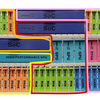Episode 213: Addison Snell and Michael Feldman analyze Google's latest move and what Cray's financials say about the HPC industry.
Silicon Valley startup Fathom Computing has announced that it is building an optical computer that can train large-scale neural networks much more efficiently than GPUs.
Hewlett Packard Enterprise (HPE) has been selected to supply seven new supercomputers for the US Department of Defense (DoD) High Performance Computing Modernization Program (HPCMP).
During Congressional testimony last week, Intel and NVIDIA proposed that the US government institute policies that would speed development of artificial intelligence. The testimony was submitted to the House Subcommittee on Information Technology, headed by Texas Congressman Will Hurd.
Episode 212: Addison Snell and Michael Feldman analyze the offerings and outlook for several new HPC startups.
Closing the books on 2017, Cray announced one of the worst financial reports in recent memory, reporting a net loss of $133.8 million. It marks the first time since 2009 that the company went into the red and represents the second worst net loss in its history.
Episode 211: Addison Snell and Michael Feldman discuss China's bid to stay atop the TOP500 list and Samsung's surprising takeover of the #1 chip supplier spot.
The Gen-Z Consortium has released Gen-Z Core Specification 1.0, clearing the way for chip vendors, device makers, and switch manufacturers to develop products based on the new standard.
Google has announced a beta program to make its in-house Tensor Processing Units (TPUs) available to cloud customers, marking the first time a custom-built machine learning chip will be accessible to a wide array of users.
Tech startup Sylabs Inc. has emerged from stealth mode and released Singularity Pro, the enterprise version of the popular container platform for high performance computing.






